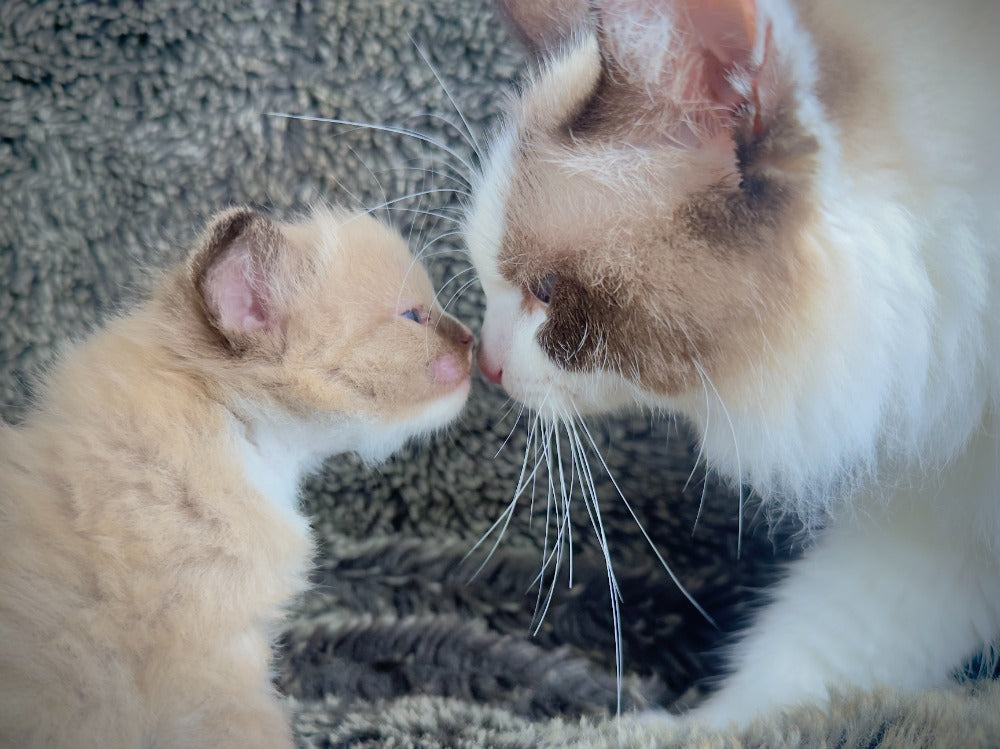
Ragdolls as Therapy and Emotional support Cats
Our cats as Emotional Support Animals for Anxious adults and Children with Special Needs
We love to perform the service of matching a therapy cat to their person and understand the vital importance of sending a person in need home with the right cat or kitten for them. Ragdolls are widely recognized as one of the most suitable cat breeds for emotional support—especially for children with special needs. Their calm, affectionate nature and intuitive emotional sensitivity make them exceptional companions in therapeutic environments. Whether formally registered as an emotional support animal (ESA) or simply a beloved source of comfort at home, Ragdolls provide consistent, nonjudgmental companionship that supports emotional and sensory regulation. We specialize in picking out therapy and emotional support cats, we are very proud of our ability to match the right cat with the right owner. We can pick out a therapy cat sight unseen but we do recommend a cattery visit to see which cat you "vibe" best with. We can even leash train your therapy cat for you for a small fee.
My son is special needs and part of the reason that we chose Ragdolls as a breed is because they are the best breed to have around children. The cats have made a world of difference to his development of empathy and helping him learn how to calm and control himself around animals. With this experience and the practice of placing cats as therapy cats we are uniquely experienced in knowing what it takes to match the right cat to the right person.
Although a superbly gentle and loving breed, not every Ragdoll is cut out to be a therapy cat. If this is your goal we will help you to select the best kitten for your specific needs. Whether that is as company for a child or an emotional support animal. Just like children, every kitten is different. It is very important to us to place the right cat in every home, but even more so if the objective is for it to be a therapy animal.
7 Reasons Why Ragdolls are the Ideal Therapy cats:
1. Exceptionally Gentle Temperament
Ragdolls are known for their relaxed, easygoing personalities. They thrive in calm environments and are unlikely to startle or react dramatically—making them ideal for children who may be sensitive to sound, movement, or unpredictability.
2. Affectionate, Yet Non-Intrusive
These cats offer affectionate companionship without being overwhelming. They love to be close—often curling up beside their humans—but they respect personal space. This is especially important for children who seek connection but can be easily overstimulated.
3. Unlikely to Scratch, Hiss, or Bite
One of the standout traits that make Ragdolls perfect emotional support animals is their extremely low reactivity. They are remarkably tolerant and rarely respond with aggression. Even if a child handles them a little awkwardly, Ragdolls are unlikely to scratch, hiss, or bite—adding a crucial layer of safety for children still learning how to interact gently.
4. Floppy, Relaxed Behavior
Ragdolls often go limp when picked up, which is not only adorable—it’s comforting. Their soft, pliable nature makes them easier for children to hold and touch, providing a soothing physical connection that helps reduce anxiety and emotional overload.
5. Emotionally Intuitive
Many families report that Ragdolls seem to “know” when someone is upset or anxious. They’ll often seek out a distressed child and sit quietly nearby, offering silent comfort. This type of nonverbal emotional support can be incredibly impactful for children who struggle with communication or sensory regulation.
6. Calming Presence
Ragdolls have a low prey drive and don’t exhibit sudden or unpredictable bursts of energy. Their gentle movements and quiet nature create a peaceful presence that can help children stay grounded and calm—especially during times of stress or sensory overwhelm.
7. Consistent and Routine-Oriented
Routine and predictability are often essential for children with special needs. Ragdolls are creatures of habit, and their calm, consistent behavior provides a sense of security and emotional stability.
A Natural Fit as Emotional Support Animals
Whether formally registered as emotional support animals or simply beloved companions, Ragdolls offer a unique blend of emotional intuition, gentleness, and steady companionship. For families with children who have special needs, these cats can become true emotional anchors—helping to regulate emotions, encourage social interaction, and provide unconditional comfort every day.
If you’re looking for a pet who brings peace, predictability, and quiet love into your home, a Ragdoll might be the perfect choice.
